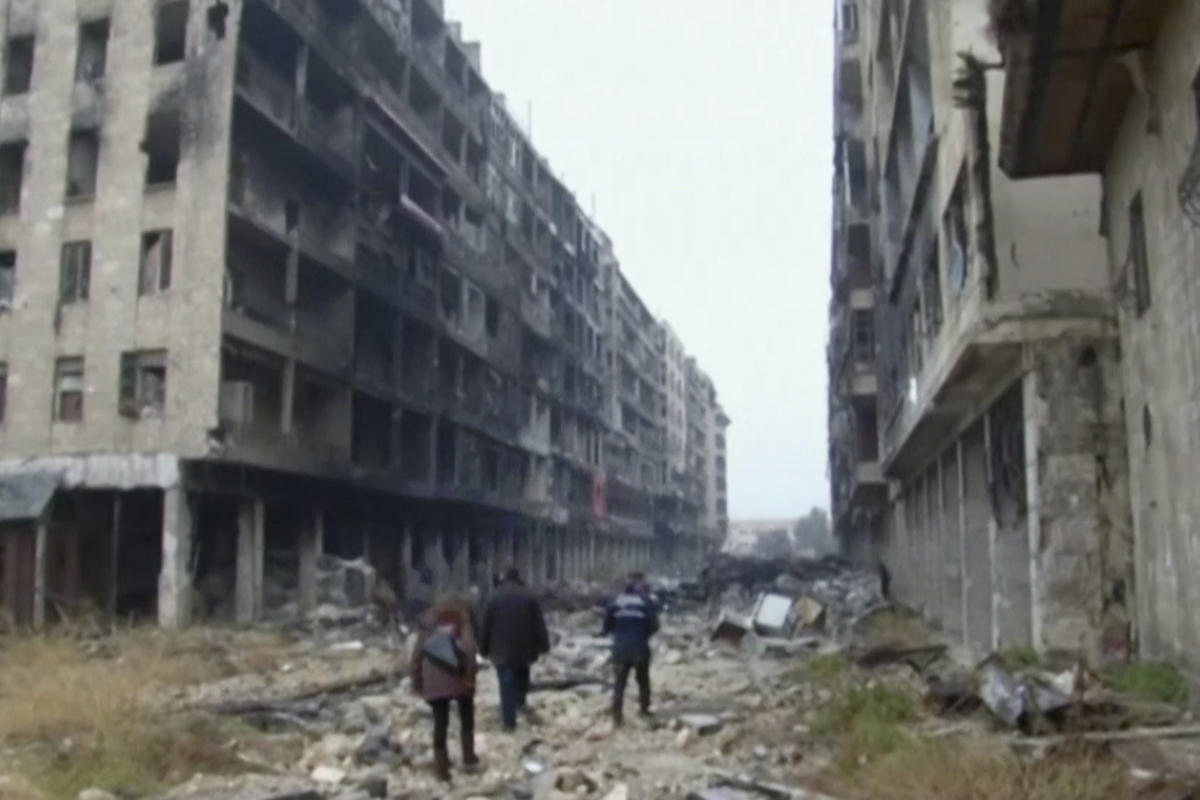The father steps down with his son from the green bus in the town of Khan al-Asal, no more than a few kilometers from their home. The father says that he will soon return “triumphantly to east Aleppo.” But his words do not please his son, who says: “No, I will grow up and not return to Aleppo. I will liberate Damascus… and bring down the regime.”
Khalid and his son Fouad were among thousands of “lucky ones” who left in the first batch of people displaced from eastern Aleppo days ago — which included wounded, children and civilians — before the effort was suspended Thursday morning amid regional efforts to resume it and the hopes of tens of thousands who had begun to gather in preparation to leave the hell.
More than 100 wounded, including children who lost their hands and legs, were moved to Turkish territory and sent to hospitals in the Turkish cities of Rihaniya and Antakya. Civilians were also distributed throughout the western Aleppo countryside. Some went to their relatives in Al-Atarib or Khan al-Asal, while others went to the town of Sarmada in the Idleb countryside, where residents so far have offered 1,650 homes to receive these families.
The new displaced people appeared exhausted. Some of them carried their elderly parents or wounded siblings, and others carried suitcases, but all of them appeared, from their faces and the color of their skin, as if they were in the film “Safar Barlik,” or in a historical series dating back to the beginning of the 20th century. They wore heavy clothes, hats, and winter boots. They went to the homes of previously displaced people who had left for other areas inside Syria or for Europe — included in the seven million displaced people inside the country and the roughly six million refugees outside Syria. Among them are more than four million in neighboring countries. Just as they left behind the souls of their dead and their memories, they found the effects of their predecessors in the torturous Syrian journey. One of them said that he entered the house of one who had left the Aleppo countryside two years ago for Europe, and that “everything was there — furniture, telephone, kitchen… There were rotten vegetables in the kitchen because there was not enough electricity.” He said that he would look for the homeowner to communicate with him “in the hope of meeting in Syria.”
In the Idleb town of Sarmada, the Turkish Shifaq group provided for newcomers, while the Mercy Corps provided assistance in Atarib, including food, water, and medical assistance, in order to prepare the empty stomachs for food. An official in one of the organizations noted how pale the arrivals were, and how hungry and thirsty they were. One of them said: “I have not seen bread for two weeks. We were eating burghul or lentils.” In a video distributed by opposition activists, one with thick eyebrows who appeared to have severe yellowing in what remains of his teeth — but he still clung to the idea of “returning, and victory, God willing.”
In another video distributed by the Aleppo Media Center, a man who appears to be in his 40s wearing a cloak and red headband steps down from a green bus in west Aleppo, and then begins to shout in heavy Aleppan accent, “We are women, not men. Where are the men? Where are the Arabs? What injustice has been done to you, Aleppo.” After a little, he shouts louder, his voice grows hoarse, and his words disappear… and he vanishes from the lens under the fog, drizzle and rain.
But a young man peers out the window of the bus to say: “Look at my legs. I lost them. I’ll get a couple of prosthetics and then I’ll go back to liberate Aleppo. I’ll go back stronger.” Another pours out his anger on the leadership of the rebel groups and “our emirs,” who, “refused to give up their emirates and fight with one hand.”
In another bus, two children who had lived more than half their lives outside the rhetorical and military control of the regime in eastern Aleppo since 2012, gazed into the camera. The first said: “Yes, we had to leave our homes and our neighborhoods, but when we get bigger, we will liberate Aleppo. We will liberate out city, my brother and me together.” But the second cut him off, saying: “God willing — but when we become men we’ll liberate Damascus and Syria too.”
This article was translated and edited by The Syrian Observer. Responsibility for the information and views set out in this article lies entirely with the author.


